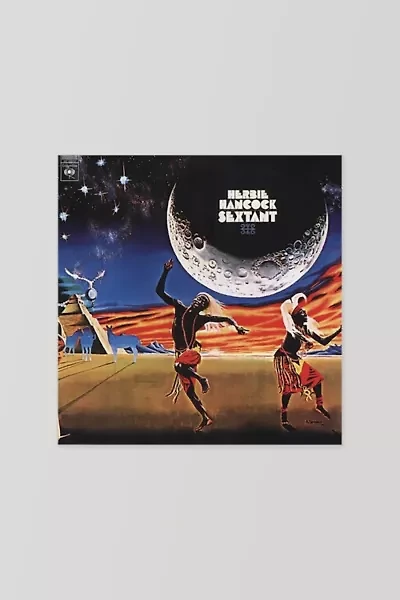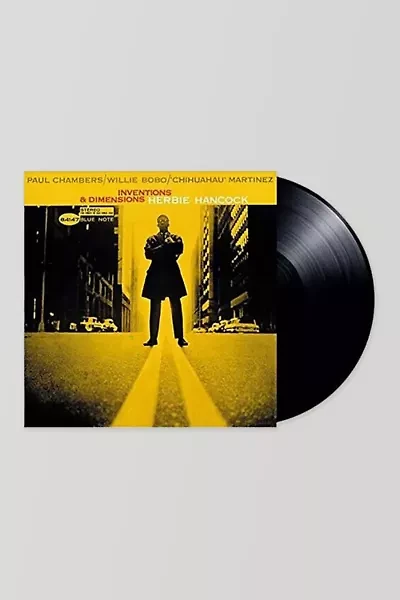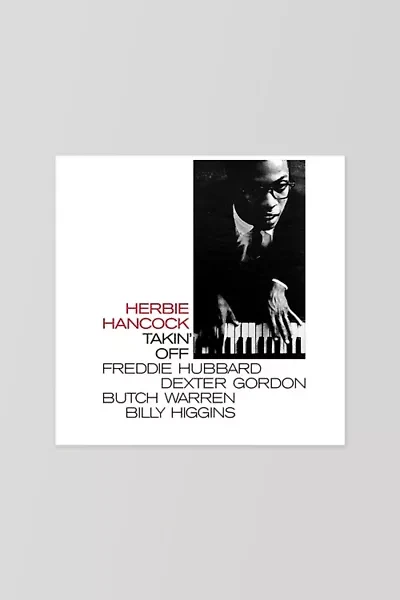Home
The Essential Herbie Hancock [Columbia/Legacy]
Barnes and Noble
Loading Inventory...
The Essential Herbie Hancock [Columbia/Legacy] in Bloomington, MN
Current price: $15.49

![The Essential Herbie Hancock [Columbia/Legacy]](https://prodimage.images-bn.com/pimages/0827969459324_p0_v1_s600x595.jpg)
The Essential Herbie Hancock [Columbia/Legacy] in Bloomington, MN
Current price: $15.49
Loading Inventory...
Size: OS
Calling a two-disc retrospective of the varied and celebrated career of
Herbie Hancock
"essential" is a tall order to fill.
Sony
/
BMG
's
Legacy
does, as would be expected, an incomplete but decent job at offering a fine representative look at the artist, and at choosing best-known cuts to do so. This set is admirably cross-licensed by producer
Bob Belden
, who also wrote the great liner notes. Disc one is a journey in and of itself and offers a fine portrait not only of
Hancock
's changes as a musician, but also the changes in
jazz
brewing at the time. It begins with
"Watermelon Man"
from
Takin' Off
,
's first
Blue Note
recording in 1962, and follows curiously enough with a fine reading of
"'Round Midnight"
off
Sonny Rollins
'
Now's the Time
offering for
RCA
in 1964. You get
"Cantaloupe Island"
and the title track from
Maiden Voyage
before
Columbia
recordings as a member of
the Miles Davis Quintet
in 1966 begin. The two quintet cuts are
"Circle"
and
"Sorcerer."
There is no electric
Miles
-era material found here. This compilation follows the artist to
Warner Brothers
for
"Tell Me a Bedtime Story"
Fat Albert's Rotunda
(the serial music for
Bill Cosby
's groovy kids cartoon show), and then moves into the solo material with
"Hidden Shadows"
Sextant
"Chameleon"
Head Hunters
. The disc ends with
"Joanna's Theme,"
from the
soundtrack
to the film
Death Wish
. When one considers what's been covered so far, the journey is actually amazing. Platter two continues with more
fusion
tracks, from
Thrust
, and a couple from the undervalued
Mr. Hands
issued in 1980, 1978's
Sunlight
, the truly awful
Monster
, and the innovative
Future Shock
(yes, it's
"Rockit"
; what else?). But there are also tracks from the many acoustic recordings he did for
such as the
Herbie Hancock Trio
disc with
Tony Williams
Ron Carter
. Ditto material from
V.S.O.P.
, the
Gershwin's World
outing, and of course the solo album
New Standard
in 1995. Fans can argue all day about what should have been left out and what should have been included but wasn't, but what does matter is how the wild twists and turns in
's career have showcased him to be a chameleon as well as an innovator. While one may wish to place
or
in a newbie's hands, this serves as an undeniably well-rounded historical introduction. ~ Thom Jurek
Herbie Hancock
"essential" is a tall order to fill.
Sony
/
BMG
's
Legacy
does, as would be expected, an incomplete but decent job at offering a fine representative look at the artist, and at choosing best-known cuts to do so. This set is admirably cross-licensed by producer
Bob Belden
, who also wrote the great liner notes. Disc one is a journey in and of itself and offers a fine portrait not only of
Hancock
's changes as a musician, but also the changes in
jazz
brewing at the time. It begins with
"Watermelon Man"
from
Takin' Off
,
's first
Blue Note
recording in 1962, and follows curiously enough with a fine reading of
"'Round Midnight"
off
Sonny Rollins
'
Now's the Time
offering for
RCA
in 1964. You get
"Cantaloupe Island"
and the title track from
Maiden Voyage
before
Columbia
recordings as a member of
the Miles Davis Quintet
in 1966 begin. The two quintet cuts are
"Circle"
and
"Sorcerer."
There is no electric
Miles
-era material found here. This compilation follows the artist to
Warner Brothers
for
"Tell Me a Bedtime Story"
Fat Albert's Rotunda
(the serial music for
Bill Cosby
's groovy kids cartoon show), and then moves into the solo material with
"Hidden Shadows"
Sextant
"Chameleon"
Head Hunters
. The disc ends with
"Joanna's Theme,"
from the
soundtrack
to the film
Death Wish
. When one considers what's been covered so far, the journey is actually amazing. Platter two continues with more
fusion
tracks, from
Thrust
, and a couple from the undervalued
Mr. Hands
issued in 1980, 1978's
Sunlight
, the truly awful
Monster
, and the innovative
Future Shock
(yes, it's
"Rockit"
; what else?). But there are also tracks from the many acoustic recordings he did for
such as the
Herbie Hancock Trio
disc with
Tony Williams
Ron Carter
. Ditto material from
V.S.O.P.
, the
Gershwin's World
outing, and of course the solo album
New Standard
in 1995. Fans can argue all day about what should have been left out and what should have been included but wasn't, but what does matter is how the wild twists and turns in
's career have showcased him to be a chameleon as well as an innovator. While one may wish to place
or
in a newbie's hands, this serves as an undeniably well-rounded historical introduction. ~ Thom Jurek
Calling a two-disc retrospective of the varied and celebrated career of
Herbie Hancock
"essential" is a tall order to fill.
Sony
/
BMG
's
Legacy
does, as would be expected, an incomplete but decent job at offering a fine representative look at the artist, and at choosing best-known cuts to do so. This set is admirably cross-licensed by producer
Bob Belden
, who also wrote the great liner notes. Disc one is a journey in and of itself and offers a fine portrait not only of
Hancock
's changes as a musician, but also the changes in
jazz
brewing at the time. It begins with
"Watermelon Man"
from
Takin' Off
,
's first
Blue Note
recording in 1962, and follows curiously enough with a fine reading of
"'Round Midnight"
off
Sonny Rollins
'
Now's the Time
offering for
RCA
in 1964. You get
"Cantaloupe Island"
and the title track from
Maiden Voyage
before
Columbia
recordings as a member of
the Miles Davis Quintet
in 1966 begin. The two quintet cuts are
"Circle"
and
"Sorcerer."
There is no electric
Miles
-era material found here. This compilation follows the artist to
Warner Brothers
for
"Tell Me a Bedtime Story"
Fat Albert's Rotunda
(the serial music for
Bill Cosby
's groovy kids cartoon show), and then moves into the solo material with
"Hidden Shadows"
Sextant
"Chameleon"
Head Hunters
. The disc ends with
"Joanna's Theme,"
from the
soundtrack
to the film
Death Wish
. When one considers what's been covered so far, the journey is actually amazing. Platter two continues with more
fusion
tracks, from
Thrust
, and a couple from the undervalued
Mr. Hands
issued in 1980, 1978's
Sunlight
, the truly awful
Monster
, and the innovative
Future Shock
(yes, it's
"Rockit"
; what else?). But there are also tracks from the many acoustic recordings he did for
such as the
Herbie Hancock Trio
disc with
Tony Williams
Ron Carter
. Ditto material from
V.S.O.P.
, the
Gershwin's World
outing, and of course the solo album
New Standard
in 1995. Fans can argue all day about what should have been left out and what should have been included but wasn't, but what does matter is how the wild twists and turns in
's career have showcased him to be a chameleon as well as an innovator. While one may wish to place
or
in a newbie's hands, this serves as an undeniably well-rounded historical introduction. ~ Thom Jurek
Herbie Hancock
"essential" is a tall order to fill.
Sony
/
BMG
's
Legacy
does, as would be expected, an incomplete but decent job at offering a fine representative look at the artist, and at choosing best-known cuts to do so. This set is admirably cross-licensed by producer
Bob Belden
, who also wrote the great liner notes. Disc one is a journey in and of itself and offers a fine portrait not only of
Hancock
's changes as a musician, but also the changes in
jazz
brewing at the time. It begins with
"Watermelon Man"
from
Takin' Off
,
's first
Blue Note
recording in 1962, and follows curiously enough with a fine reading of
"'Round Midnight"
off
Sonny Rollins
'
Now's the Time
offering for
RCA
in 1964. You get
"Cantaloupe Island"
and the title track from
Maiden Voyage
before
Columbia
recordings as a member of
the Miles Davis Quintet
in 1966 begin. The two quintet cuts are
"Circle"
and
"Sorcerer."
There is no electric
Miles
-era material found here. This compilation follows the artist to
Warner Brothers
for
"Tell Me a Bedtime Story"
Fat Albert's Rotunda
(the serial music for
Bill Cosby
's groovy kids cartoon show), and then moves into the solo material with
"Hidden Shadows"
Sextant
"Chameleon"
Head Hunters
. The disc ends with
"Joanna's Theme,"
from the
soundtrack
to the film
Death Wish
. When one considers what's been covered so far, the journey is actually amazing. Platter two continues with more
fusion
tracks, from
Thrust
, and a couple from the undervalued
Mr. Hands
issued in 1980, 1978's
Sunlight
, the truly awful
Monster
, and the innovative
Future Shock
(yes, it's
"Rockit"
; what else?). But there are also tracks from the many acoustic recordings he did for
such as the
Herbie Hancock Trio
disc with
Tony Williams
Ron Carter
. Ditto material from
V.S.O.P.
, the
Gershwin's World
outing, and of course the solo album
New Standard
in 1995. Fans can argue all day about what should have been left out and what should have been included but wasn't, but what does matter is how the wild twists and turns in
's career have showcased him to be a chameleon as well as an innovator. While one may wish to place
or
in a newbie's hands, this serves as an undeniably well-rounded historical introduction. ~ Thom Jurek






![The Essential Stephen Sondheim [Barnes & Noble Exclusive]](https://prodimage.images-bn.com/pimages/0196587221911_p0_v4_s600x595.jpg)
![Jammin' with Herbie [Renaissance Records]](https://prodimage.images-bn.com/pimages/0630428068827_p0_v3_s600x595.jpg)









